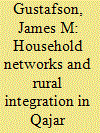| Srl | Item |
| 1 |
ID:
132651


|
|
|
|
|
| Publication |
2014.
|
| Summary/Abstract |
This paper uses Q methodology to reveal stakeholder perceptions on how best to address energy issues in Africa. We sampled a group of stakeholders involved in various energy sub-sectors to uncover perspectives on how to achieve and promote access to modern energy, energy efficiency and renewable energy in Africa, whether the perceptions could be correlated to educational or geographical background and implications such patterns could have on policies and current dialogues.
We found that all stakeholders agree on the need to prioritise sustainability but had different views on how to achieve sustainable energy for all in Africa, depending on the relevance given to each energy driver. Stakeholders could be categorised into four groups: (I) preference of large-scale high-impact projects; (II) supporters of targeted sectoral solutions with preference for small-scale technology and microfinance; (III) supporters of centralised solutions with preference for grid extension, and (IV) supporters of local entrepreneurship with scepticism about centralised solutions. The results show that differences in stakeholders' perceptions can be associated with respondents' educational but not geographical background. This implies that dialogues on energy in Africa should focus on inter-disciplinary understanding while further examining the trans-continent consensus that appears to have been established.
|
|
|
|
|
|
|
|
|
|
|
|
|
|
|
|
| 2 |
ID:
131515


|
|
|
|
|
| Publication |
2014.
|
| Summary/Abstract |
The governorships of Muhammad Isma?il Khan Vakil al-Mulk (1859-68) and Murtaza Quli Khan Vakil al-Mulk II (1868-78) in Qajar Kirman were highlighted by an extensive building campaign which initiated a period of significant social and economic change in the province. This article explores the activities of local elites in managing their family estates in the context of this project through a careful analysis of provincial geographical and historical writings, Persian-language travelogues, and commentary by European administrators and travelers. Kirmani elites began investing in land and commercial agriculture on an unprecedented scale, accelerating Kirman's absorption into global economic patterns as a producer of raw materials like cotton, wool, and opium. An integrated political economy developed regionally through the expanding networks of elite households and their estates, reinforced by families combining landownership with administrative functions in rural areas. This process demonstrates the extent to which Iranians were active participants in transforming their communities in the context of the advance of global capitalism, with longstanding patterns of elite household competition playing an important role in mediating social and political change locally.
|
|
|
|
|
|
|
|
|
|
|
|
|
|
|
|
| 3 |
ID:
132629


|
|
|
|
|
| Publication |
2014.
|
| Summary/Abstract |
Specific strategies for the energy sector should be a central part of a sustainable mountain policy. However, there is a lack of research on the energy issues of mountainous areas and specialized energy policy measures cannot be effectively supported. The determination of the energy demand in mountainous areas, which is an essential step in the direction of developing mountain energy policy, is analyzed in this paper. Greece has been selected as a case study. The results show that altitude is the decisive factor affecting degree-days and energy needs, within the geographical range of Greece. It is proved that the thermal, as well as the total energy demand are significantly increased in mountain settlements. The annual energy expenditure of a typical residence lying at an altitude of 1000 m proved to be 85% higher than the corresponding cost at sea level. This makes mountainous populations vulnerable to energy poverty. It is also proved that the subsidy policy for heating oil, in Greece, cannot alleviate energy poverty. The results of the present study can be utilized in the direction of re-designing the present policy and this is a completely necessary step for creating a sustainable policy for mountainous areas, in general.
|
|
|
|
|
|
|
|
|
|
|
|
|
|
|
|